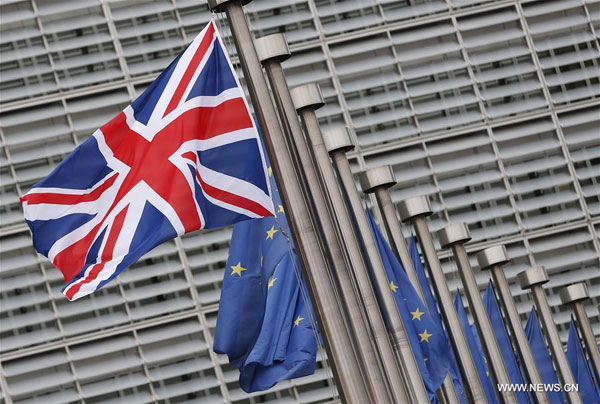What Brexit would mean for Asia's economy
(Agencies) Updated: 2016-06-22 07:44
 |
|
Photo taken on Jan 29, 2016 shows the UK and EU flags outside the European Commission headquarters in Brussels, Belgium. [Photo/Xinhua] |
That's according to a note by London-based Capital Economics, which said a Brexit would cause at most a GDP drop of 0.2 percent across Asia.
The research company based its finding on a worst-case scenario estimate by the National Institute of Economic and Social Research, a London-based think tank, which said Brexit would reduce British imports by 25 percent worldwide within two years.
Exports to the UK presently account for only 0.7 percent of Asian countries' GDP, according to Daniel Martin, senior Asia economist at Capital Economics. "Even a 25 percent decline in UK imports would knock less than 0.2 percent off from regional GDP."
Only a few economies in Asia would see a noticeable effect on growth, Martin said. Examples include Cambodia and Vietnam, which have stronger trade ties with the UK.
Martin said that Brexit would have only a limited impact on emerging Asia, and the main risks to the region lie elsewhere.
In a separate paper, Capital Economics said the effects of Brexit would be equally subdued in the region's largest economy.
China's exports to the UK are equivalent to just 0.5 percent of Chinese GDP, Chang Liu and Julian Evans-Pritchard wrote in a note published on Friday.
"China is also well-placed to weather any post-Brexit selloff in financial markets," they said.
"Because China's capital account remains largely closed, the financial linkages between China and the rest of the world are fairly limited. Meanwhile, large foreign reserves mean the authorities could support the renminbi in the event that it came under renewed downward pressure."
Nevertheless, an array of Asian companies have made their preferences clear in favor of Britain remaining.
Eric Delomier, an investment specialist at Capital Group's Singapore office, said there would be geopolitical and trade implications for the region.
"The UK leaving the union would be seen overall negatively from a trading perspective by most Asian countries," he said.
- Regulator says investors are more upbeat on renminbi
- JD sees online grocery growth
- High-tech program on microbiome-based research launched in Qingdao
- Qyer launches Chinese travel guidebook in Paris
- Macao, Guangdong to further cooperate on 'Belt & Road' construction, youth projects
- China stresses coal mine safety in flood season
- China's consumer drones market sets to boom in 2017
- Less market anticipation for yuan weakening: Report


















